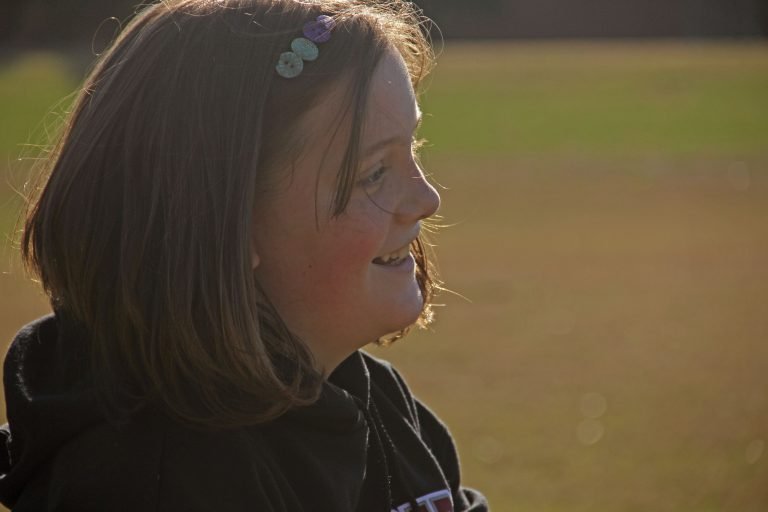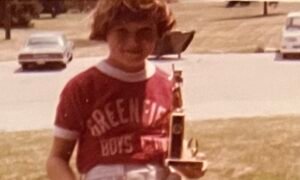My relationship with food and with my body is complicated, slippery, broken. My ability to deal with it from a place of reason and intellect waxes and wanes. No matter how it may or may not manifest itself, I will always have an eating disorder.
Just as rape is not about sex, eating disorders are not necessarily about food. For me, it is a hole that needs to be filled; an endless, confusing journey toward self-acceptance and the ability to say without second-guessing: I am worthy, I am whole, I am enough. It is about control, or lack thereof. It is about shame.
* * *
I can’t be trusted around food. I don’t trust myself to prepare it. I don’t trust myself to eat it. When other people cook for me, it feels safe. And I know what they choose for me is better than what I might choose for myself.
I am constantly at battle with my body and my mind. Never, ever comfortable in my own skin. Even when I lost 60 pounds, I felt like a fraud. People said to me, “You look fabulous! Keep up the good work!” And I thought… So, did all those years of being overweight mean I was bad? I couldn’t hear their compliments because I twisted and gnawed on them until the bitter was all I could taste.
Physically, I felt good when I was lighter. And this little clawing creature in the back of my brain said: This is unsustainable. You cannot make this last.
The minute I started to gain the weight back, the silence of my friends and family was deafening. No one said, “You look great! Keep it up!” And I heard what they were truly saying through the void. I heard their disappointment and their disapproval, even if they didn’t hear it themselves. That silence fed my deepest fears — that I was only worthy of approval when the numbers were decreasing.
* * *
I remember one of the very first dates Chris and I shared. I was a thin and athletic 18-year-old, addicted to laxatives and diet pills, existing in a dangerous cycle of bingeing and purging. He took me to Renee’s — a quaint French bistro in Broad Ripple — and he watched as I ate a basket of baguettes, then another. He confessed to me later, “I watched you eat all that bread. You were so beautiful and so funny and I knew you were going to go home and throw every last bit of it up. And I knew there was nothing I could do to stop you or to change your mind. So I just loved you instead.”
It is heartbreaking to hear what my food choices have done to others. I wanted it to be a private, secret place. But it never is. There is a desperate selfishness in those who cannot make peace with their own bodies. My mom had to lie awake at night worrying. Chris, too.
I understand that now because I see my own daughter pulling her shirt down over her bottom, looking at herself in the mirror and asking, “Do these jeans make me look fat?” And my answer is always — always — inadequate. Ultimately, I say too much, gushing about how beautiful and perfect she is. I know that to her young ears, it probably sounds hollow and insincere. She hears so many different messages in this world. Most of them say to her, “You are perfect when you are this size. You will fit in when you can wear this.” I don’t want her to hear those messages, but she will. We all do.
* * *
My high school basketball coach — when I was 16, fit and strong and healthy — said to me offhandedly, “You’d be so much faster if you lost 20 pounds.” It became my life’s mantra. It was my fill-in-the-blank script.
You’d be so much ______ if you lost 20 pounds. Prettier, faster, healthier, more attractive, smarter, more worthy. If you lost 20 pounds, you’d be enough.
I have spent my life trying to be what someone else thought I should be. I have wasted much time equating my worth with my weight. I have lamented the amount of space I take up on this earth. Too much, too much… the voice in my head whispers.
There is no blame in what I’ve experienced except that which resides within me. This is my issue, my cross, fueled by what I chose — and choose — to see and believe about myself.
* * *
The voids in our lives manifest themselves in many ways. Some drink to fill them. Some exercise. Some work themselves into an early grave. Some hoard money and things. For me, it’s all about food. It’s about stuffing myself until I’m sick. It used to be about throwing it all back up, watching it flush away. Now, I just sit with it. It spreads out from my stomach and my hips, this ugliness and insecurity. It is always with me.
Having an eating disorder is not a switch that can be turned on or off. A doctor (not my own) once said within earshot, “I don’t understand why it’s so hard to lose weight. You just shut your mouth.” Another said to me, “This is a phase. You will grow out of it.” Both were callous, insensitive statements. I understand that truth now. I didn’t at 16. Those statements were yet another way for me to beat myself up about who I was… and who I wasn’t. About what I was able to control… and what controlled me.
I know in my heart and my head what I should choose to eat. I know how much I should weigh. I know how to get there. I know when I sit down with a bowl of ice cream that, more often than not, I shouldn’t. And it’s an internal struggle… every time. But I also know that ice cream is just a substitute for something else, something that needs to be filled. Something that only I can grant myself. Acceptance? Grace? Forgiveness?
* * *
Even today, in conversations about being overweight, my well-meaning friends say, “Don’t you worry about what kind of example you’re setting for your daughter?” And my answer is this: Yes. YES. I worry every second of every day about how my dysfunctional relationship with food affects me, my daughter, my sons, my family. Every. Single. Second.
I have an adoring husband who loves me exactly as I am. By all external measures, it should be enough, I know… this unconditional love. But the key is in learning to love myself wholly. This is an internal job. Chris says to me, “You are beautiful. You are perfect. You are everything I’ve ever wanted.” And I snap back at him, “Look at these thighs! Look at this stomach! Look at these chubby cheeks! You are enabling me with your love.” That’s the kind of circular logic my brain concocts. He cannot win. His love cannot save me from myself. That conversation is a rabbit hole for him.
But how much worse is it for those who feel completely unloved and under-appreciated? For those who never hear words of kindness and compassion? I have been loved so well and so completely in my lifetime. My heart splits for those who must go it alone.
* * *
Bulimia has rendered me a different person physically, even though my most prominent battles with it ended over twenty years ago. The damage that’s been done to my body becomes evident as I age. After years of being addicted to laxatives, my digestive system doesn’t work correctly. My teeth are cracking and breaking, the enamel long ago destroyed. My metabolism has been altered, and I fight anxiety and depression on the daily. This is not a disease I would wish on anyone. It is a silent, private shame. It is a selfish, singular state of being. I hate being fat, and I am uncomfortable being thin. My skin — with its stretch marks and sag — feels foreign. I try not to look at it.
I am 99.9% better today than I was 20 years ago, but I will never be “cured.” Why? Because bingeing and purging is always an option. Laxatives are readily available. And food is necessary for survival. If my ultimate goal is to lose weight, I know how to do it. I can get there. And I can distinctly recall that rush of endorphins that comes from bingeing and purging. It is always hidden, tucked away… my secret stash of self-preservation, my easy path to a fleeting and flimsy measure of success.
* * *
Why am I talking about eating disorders? Because they are prevalent and pervasive. And they are devastating. We need to change the conversation, to create a new and different reality for future generations.
My friends and I discussed Ex-Lax and Dexatrim in locker rooms, in dorm rooms, in sorority suites. We need to make sure there are other discussions happening as well. I have spoken with my 13-year-old daughter about eating disorders, about food, about healthy choices. I want her to know there is a soft place to land when her friends begin the discussions… or continue them. I want her to know that I’ve been there, that she doesn’t have to go.
Such pressure exists for our young people to achieve a level of perceived perfection. Get good grades, participate in extra-curriculars, achieve a societal standard of physical acceptance, run yourself ragged trying.
Here’s what I’d like for our kids to hear instead: Do your best, work hard, be kind, give back, help those less fortunate, make healthy choices, embrace what makes you different and unique, focus out.
Those with body image issues will still pick and choose what sticks, but if they hear it enough, perhaps some day it will sink in and become part of a more positive, more constructive internal dialogue.
Here’s what we need to say to our children, to our friends, to our family members, to our fellow human beings: I love you. You’re powerful. You make me smile. You make a difference.
You are worthy.
You are worthy.
You are worthy.






19 Responses
Thank you for this. I have a beautiful 15 year old daughter who hates her body and hates herself, and it breaks my heart. All I can do is walk beside her and speak truth into her heart, even when she rolls her eyes at me. Thank you for giving me hope that she will grow to be courageous, like you.
Thank you for your kind words, Jennifer. 15 is so tough and fragile, isn’t it? Much peace and joy to you and your daughter. XO
Thank you for sharing this story. Your writing comes across the page/screen at the heart level. Sending love and lightness to you and yours.
Thank you, Margaret. XO
Thank you, thank you, thank you for this! Justine
Thank you, Justine. XO
I never had bulimia, but everything else, every single word, struck deep to my core. So much truth and wisdom here. Thank you. Thank you. Thank you. Your honesty and willingness to bring light around this darkness IS enough. You are enough. You are worthy. You are worthy. You are worthy. Thank you. – From one broken (and healing) woman to another.
Thank you, Caroline. (That’s my beautiful Mama’s name, too!) We all break in certain places, don’t we? Grateful to be sharing the journey. XO
Your words, my heart. So thankful…
Thank you, Sarah. XO
Katrina…this is the most powerful thing I’ve read all day. I am where you are and struggling with how to have these hard conversations with my girls. And my boys.
Thank you, Karin. That means a great deal to me. And yes, the conversations are hard, aren’t they? But sadly, so necessary. Much peace to you.
Thank you for sharing your Brutiful Brave!!
While reading this I kept wondering where our stories would diverge, only to find that they did not… I relate to so much of what you have experienced. I am raising sons, not daughters, but I also want them to know they are loved, confident and beautiful no matter what they may look like on the outside.
This was a beautiful essay. Profound, really. Some days I wonder if I could have solved world hunger if I had dedicated the time spent exercising and counting calories helping with that crisis instead. And it is so ironic that so many people have no food and yet here we are locked in the struggle to “lose those last twenty.” Sometimes a prayer in the morning can help. Bravo for being married to someone so wonderful. Your relationship will teach your children a great deal. All moms struggle with every decision. You sound like you are moving in the right direction. Bravo.
Be kind to Katrina…she’s kind of amazing. ♥
Found you through the Momastery…this blog is just awesome. Thank you so much for sharing your heart.
You are worthy. I am worthy. It is messy, but writing it out makes it beautiful, because you are not alone.